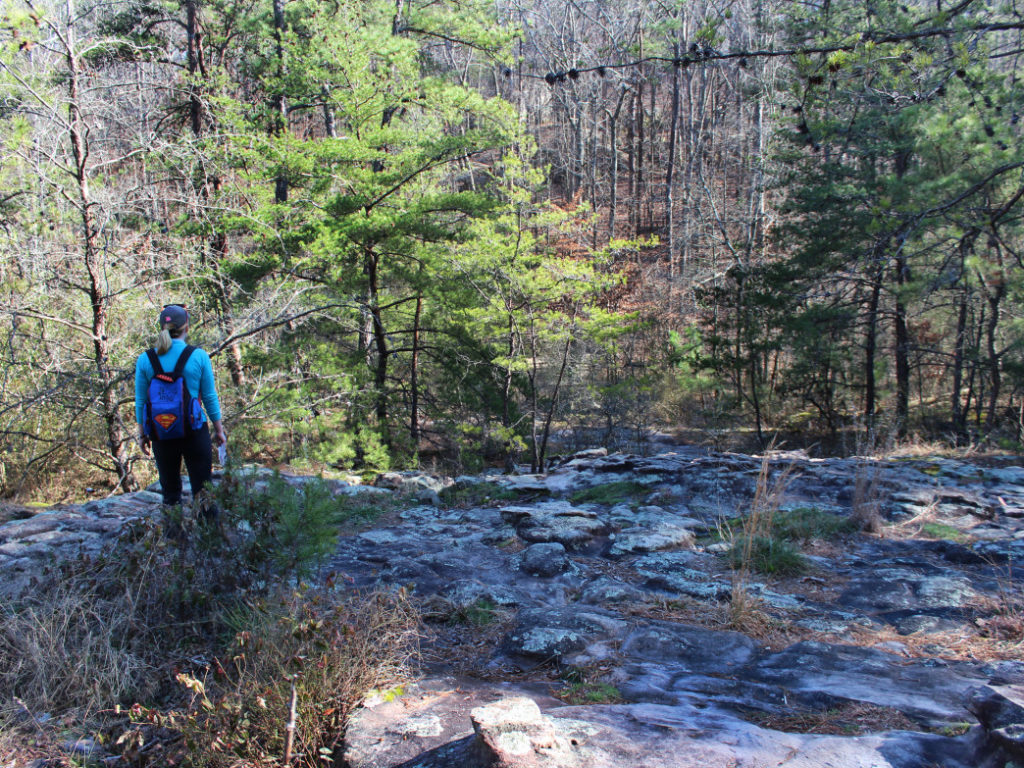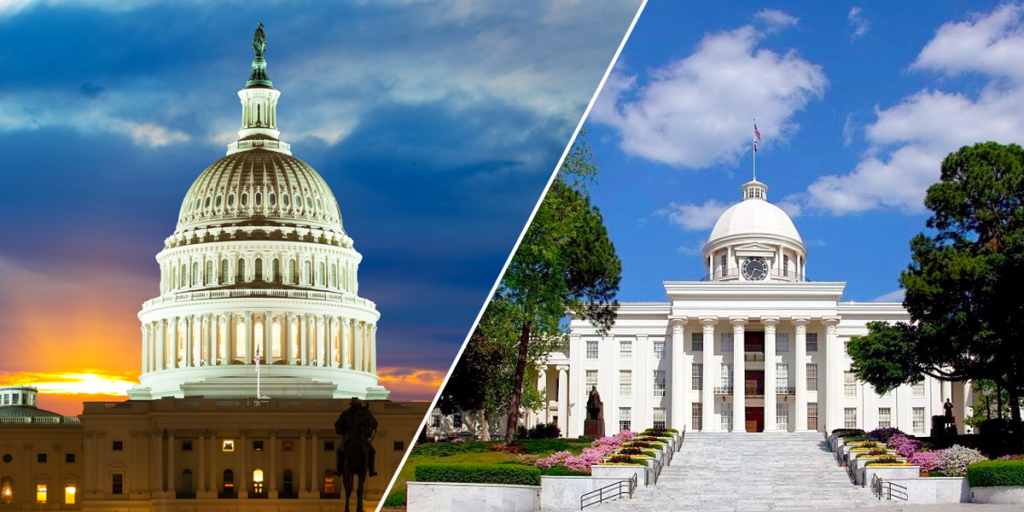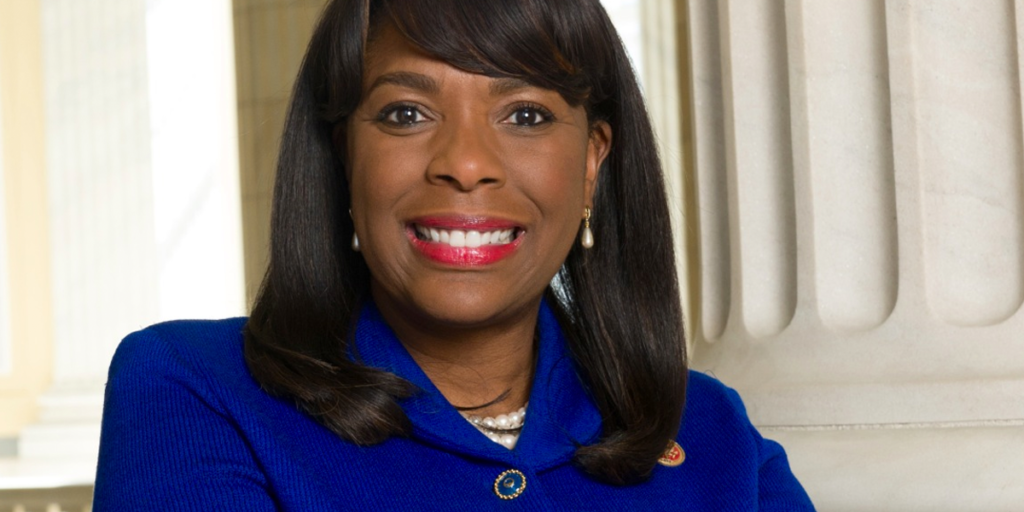$1.5 million homeland security grants issued to Alabama first responders

Governor Kay Ivey on Monday announced first responders from across the state will receive Homeland Security grants totaling $1.5 million. The grants will provide sheriffs’ offices, police departments, fire departments and other first responders the opportunity to acquire new equipment, as well as to conduct training in three categories: interoperable communications, critical infrastructure/soft target protection and weapons of mass destruction (WMD) response. “Homeland Security is hometown security,” Ivey said. “Our first responders are the first line of defense for Alabama. As such recent events as hurricanes that swept through the Southeast to the terrorist attack in New York City demonstrated, first responders must be trained and ready to respond to natural disasters and man-made events.” Forty-three first-responder organizations of varying sizes will receive the 2017 grants. The grants include funds for such equipment as a metal detector scanner for Lowndes County Sheriff’s Office, camera system for Morgan County EMA, and radios for Camden Police Department, Bullock County Sheriff’s Office and Mount Weisner Fire Department. Secretary of the Alabama Law Enforcement Agency Hal Taylor said, “I want to thank Governor Ivey for her support of men and women who dedicate their own lives to protecting the lives and property of Alabama’s citizens. These grants will further enhance their capability to be ready when needed.” ALEA administers the FEMA State Homeland Security Grant Program in Alabama. All local first-responder agencies were eligible to apply for funding. Representatives from such first-responder professional associations as the Alabama Association of Emergency Managers, Alabama Association of Chiefs of Police, Alabama Fire Chiefs Association and the Alabama Sheriffs Association reviewed and scored grant applications.
Kay Ivey awards $3.3 million to enhance recreation in Alabama

Alabamians will soon have even more ways to enjoy the outdoors thanks to $3.3 million in grants awarded by Gov. Kay Ivey to expand recreational trails in several communities across the state. Ivey has awarded 18 grants to help improve or construct recreation venues in nine municipalities, numerous state parks, a university campus and several other trail systems throughout the state. “Outdoor trails lead to healthier minds and bodies, and they are a great investment in our state and communities,” said Ivey. “I welcome these new or improved trails, and I encourage everyone to visit one and experience the outdoors that Alabama offers.” The grants were awarded from funds made available to the state from the Federal Highway Administration’s Recreational Trails Program. The Alabama Department of Economic and Community Affairs (ADECA) administers the program in Alabama. “Gov. Ivey and I both applaud those elected officials, individuals and organizations who work so hard to improve recreation opportunities in their communities,” ADECA Director Kenneth Boswell said. “I am pleased that ADECA is a partner in this process to enhance recreation and make our communities better places to live.” The Alabama Department of Conservation and Natural Resources, which manages Alabama’s state parks, was awarded three grants totaling $564,400. A $300,000 grant will help build a nature trail for low-powered, reduced-noise motorized vehicles like golf carts, at Lakepoint State Park in Eufaula. A $64,400 grant will enable the department to build a diverse-use trail at Joe Wheeler State Park near Rogersville. The department will use a $200,000 grant to buy trail maintenance and construction equipment for the building and upkeep of trails throughout the state parks system. Below is a description of other grants, listed geographically from north to south: Limestone County Commission – $128,800 to upgrade the 10.8-mile-long Richard Martin Trail including repairing two bridges, installing two interpretive signs, controlling erosion and completing a trail assessment study. The trail extends from just north of Athens to the Tennessee state line. Athens – $200,000 for a 1,200-foot-long extension of Swan Creek Greenway, purchasing one acre and constructing a new trailhead at the newly acquired property. Decatur– $199,985 to construct an 825-foot-long, 8-foot-wide multi-use trail along Wilson Street. The trail, which will also be an extension of the Dr. Bill Sims Bike Trail, connects Rhodes Ferry Park and Ingall’s Harbor Pavilion. Cullman City Utilities Board – $193,092 to construct three trailheads along the 21-mile-long, multi-use trail at Duck River Reservoir. Cullman County Commission – $550,473 to construct a bathhouse and multiple wash stations at Stoney Lonesome Off-Highway Vehicle Park near Bremen. The 1,456-acre park, which has received previous Recreational Trail Program grants is a motorized park that accommodates small and large vehicles and has a campground. Shelby County Commission– $200,000 to construct a trailhead and a five-mile-long, multi-use trail at Cahaba River Park. Childersburg – $200,000 to expand the Kymulga Grist Mill park property with an additional 160 acres, construct seven miles of multi-use trails, install a trailhead and pave the parking area. Cahaba Medical Foundation (Centreville) – $120,000 to renovate and expand the Centreville Riverwalk and construct a scenic overlook and access for kayaks/canoes to promote increased recreation traffic along the Cahaba River. Tallapoosa County Commission – $200,000 to resurface a quarter-mile-long, multi-use track at Dadeville High School. Lanett – $41,840 to construct about a half-mile walking trail at Lanett Central Park with security lighting, signage and landscaping. Troy University (Troy) – $200,000 to build a 1,200-foot-long trail along McKinley Drive and an 800-foot-long trail along Luther Street adjacent to Janice Hawkins Cultural Arts Park. Pine Hill – $49,084 to resurface the existing walking trail and add new lights at the city park. Thomasville – $60,984 to construct a 10-foot-wide, 1,200-foot-long walking trail at Thomasville Community Playground. Mobile County Commission – $182,160 to construct a 10-foot-wide, three-quarter-mile paved multi-use trail at Chickasabogue Park. Trailside benches will be added. Orange Beach – $116,532 to construct a .65-mile trail to connect the Hugh S. Branyon Backcountry Trail to the Orange Beach Sportsplex. The connecting trail will loop around a lake and a natural area.
Leigh Hixon: Saving our sovereignty

Part II of III in a series on Alabama’s Federal Dependency. Please visit Alabama Policy Institute’s website to view the Alabama statewide poll results. Part I We Dare Defend Our Rights was published on November 6, 2017. ••• While it is difficult to persuade a state that relies on the federal government for 42% of its budget that it should begin to unwind some of those funds, there is arguably more for a state to gain than lose by shedding some of its dependence on the federal trough. But even if voluntarily forgoing such assistance is a bridge too far, it is becoming more and more essential for the state to assume greater financial responsibility. Alabama voters are looking at legislators to do just that. An overwhelming 79% of recently surveyed Republican primary voters considered it important for Alabama to be financially prepared for the likelihood that DC will reduce its funding to the state. Questions about Washington’s reliability are well founded, given the nation’s own financial and political health. Even the most politically disengaged must pause to fathom the $20 trillion (and rising) debt amassed by our federal government. What’s more, in an increasingly politicized environment, states have seen federal funds threatened over policy differences with sitting presidents of both parties. Whether unable or unwilling, nothing binds Washington to sustain the support on which states have become accustomed. But there are other reasons to approach conditional federal grants with caution. When a state accepts conditional funding, it necessarily relegates itself to the dictates of Washington, selling short both legislators and citizens alike; state lawmakers are unable to influence the policies imposed on their constituents and cannot be held responsible for complications in implementation. Accordingly, citizens must rely on a detached DC bureaucrat to address concerns about policy impacts on their lives and businesses. Voters resent this “Mother May I?” approach to lawmaking. Nearly three-quarters of those surveyed trusted the efficiency of state-run programs over federally run programs, while only 34% indicated any faith that federal spending in Alabama reflects our state’s values and priorities. Furthermore, the nature of grants conditioned on DC mandates invites cynicism that develops when governing policy and law is developed by a far-removed legislative body. Only 33% of voters polled felt informed about the federal policy “strings” attached to money already accepted by the state. These obstacles to accountability and transparency—hallmarks of good government—hinder voters’ ability to identify or expound on specific programs and is a pariah to the spirit of the American system, which rests on the consent of the governed. Making a bad situation worse, federal funds can lead to increased spending in already-strained state budgets, a consequence opposed by 67% of respondents surveyed. This can happen directly, such as when grants require matching funds or financing beyond the initial federal investment to maintain or enhance a program. But it can also happen indirectly, either when federal grants encourage states to undertake projects they would not otherwise choose or when state or local taxes are increased to bankroll overextended commitments. Whatever the cause, “free” money can become expensive quickly. Because spending is often the first solution offered by Washington, conditional grants sometimes involve sympathetic causes, such as disaster relief or, on a smaller scale, safety equipment for law enforcement. Such programs create short-term fanfare for politicians and temporary relief for beneficiaries, but they invite a potential crisis when the money runs dry. Once the federal government assumes responsibility for essential services, citizens and states are left dependent on the whims of Washington to meet critical needs. Of course, Washington’s willingness to meet these needs is not based on benevolence; rather, it is driven by a desire to impose a particular agenda simply by dangling an irresistible carrot. But the resources and attention required to avoid the proverbial stick detract from priorities state legislators and officials might pursue if left to their own devices. Ironically, conditional funding can even lead the state to work against the wishes of its own citizens, as was the case with Race to the Top dollars associated with Common Core. In an era of Washington overreach, Alabama must begin to challenge the mechanisms that make us beholden to the federal government if constitutional state sovereignty is what we desire. Taking a closer look at conditional federal funding—phasing out existing commitments and more critically evaluating future opportunities, while reevaluating the allocation of our own state funds—is a good place to start. ••• Leigh Hixon is Senior Director of Policy Relations for the Alabama Policy Institute (API). API is an independent, nonpartisan, nonprofit research and educational organization dedicated to strengthening free enterprise, defending limited government, and championing strong families. If you would like to speak with the author, please e-mail communications@alabamapolicy.org or call (205) 870-9900.
Donald Trump shies away from Roy Moore amid growing allegations

It’s arguably the most talked about Senate race in 2017, and President Donald Trump has taken a noticeable step back from special election in Alabama, as he continues to distance himself from GOP Senate candidate Roy Moore. Trump has not tweeted or spoken publicly about Moore since The Washington Post published an explosive report over a week ago with the accounts of four women who claim Moore sexually pursued them when he was in his 30s and they were in their teens. Since that time, five additional women have made accusations against Moore. They range from inappropriate conduct to groping and sexual assault. Trump’s lone comment since the news broke was made via White House Press Secretary Sarah Huckabee Sanders, telling the White House press pool, “Like most Americans, the president believes we cannot allow a mere allegation, in this case, one from many years ago, to destroy a person’s life. However, the president also believes that if these allegations are true, Judge Moore will do the right thing and step aside.” Some White House aides believe there’s more to his decision to sit back than meets the eye. They believe Trump — who has faced allegations of sexual misconduct himself and was caught on tape making lewd comments about women back in 2005 — is uncomfortable with the accusations against Moore, and is thus is leaving it to the Alabama voters to decide his fate. “We are uncomfortable with the explanations that Roy Moore has given to date,” said White House legislative director Marc Short. Speaking of Trump’s position, Short said, “Obviously if he did not believe that the women’s accusations were credible, he would be down campaigning for Roy Moore.” Moore is running to fill the Alabama U.S. Senate seat vacated by Jeff Sessions when he became attorney general, has vehemently denied allegations. He faces democrat Doug Jones on Dec. 12.
Terri Sewell hosts Thanksgiving week town halls across 7th District

While many members of Congress have shied away from town hall meetings the past few years, Alabama 7th District U.S. Rep. Terri Sewell continues to host a town hall every year in each of the 14 counties she represents. During Thanksgiving week, Sewell will host two days “Congress in Your Community” town hall meetings in four counties: Choctaw, Clarke, Marengo, and Perry Counties. During the town halls, Sewell will answer questions from constituents, provide an opportunity for them to share their views and concerns, and hear updates on the latest in Congress. Choctaw County Town Hall Monday, November 20, 2017 11:00 a.m. – 12:00 p.m. Pennington Town Hall 282 Pine Grove Road Pennington, Ala. 36916 Clarke County Town Hall Monday, November 20, 2017 4:00 p.m.– 5:00 p.m. Grove Hill Town Hall 111 S. Church Street Grove Hill, Ala. 36451 Marengo County Town Hall Tuesday, November 21, 2017 10:00 a.m.– 11:00 a.m. Bryan Whitfield Memorial Hospital Hospital Classroom 105 US Hwy 80 East Demopolis, Ala. 36732 Perry County Town Hall Tuesday, November 21, 2017 1:00 p.m.– 2:00 p.m. Sowing Seeds of Hope 1728 Washington St. Marion, Ala. 36756 Thus far in 2017, Sewell has hosted town halls in Jefferson County, Pickens County, Tuscaloosa, Dallas, Montgomery, Wilcox and Lowndes.
Bradley Byrne: Pause to count your blessings

As we celebrate the Thanksgiving holiday, I want to put the political debates of today aside and take time to reflect on the many blessings that we all-too-often take for granted. As I sat down to write this column, four very distinct blessings came to my mind. The first blessing we all have is life. I was reminded of that earlier this year when my granddaughter Ann-Roberts Byrne was born. She was, like all of us at that point in our lives, small, weak and helpless. But life radiated from her, shooting out like little rays. It reminded me of a line from a poem by the British poet, William Wordsworth: “Heaven lies about us in our infancy!” But there is also life in an elderly person, like my mother in law, Flora Dukes, who radiated like the sun in the days leading up to her death four years ago. All life – new, old, and in between – is precious, because it is an individual gift to each of us from our Creator. The second blessing is family and good friends. We weren’t made to be alone. In fact, in the Creation story, God made Adam and put him in the Garden of Eden, but saw that something was missing, saying “It is not good that the man should be alone.” We are all made more complete in our rich and loving relationships with each other. Look at the child in her mother’s lap reading a story, two friends sharing a secret only the two of them would truly understand, or neighbors after a hurricane has struck coming to one another’s aid. A British clergyman named John Donne once said in another poem, “No man is an island, entire unto itself, Everyman is a piece of the continent, a part of the main.” The third blessing is the world around us. Not the human made stuff, but the natural world. Here on the Gulf Coast we are so richly blessed with an abundance of rivers and streams, bays and lakes, the Gulf of Mexico and the Mobile Tensaw River Delta, our abundant woods and beaches, and the greatest diversity of plants and animals in North America. There is also the glorious light of the rising sun, and the deep beauty in its setting; the warmth of a spring sun, and the welcome cool breeze just before a summer thunderstorm breaks; and the quiet beauty of it all, if we would just stop, be quiet and take in this natural world. The final blessing is our freedoms and our rights. The Founders of our country declared our independence with these words: “We hold these truths to be self-evident, that all men are created equal, that they are endowed by their Creator with certain unalienable Rights, that among these are Life, Liberty and the pursuit of Happiness – That to secure these rights, Governments are instituted among men, deriving their just powers from the consent of the governed.” We all have the freedoms of religion, speech, press, assembly and petition; and the right to bear arms. These and many others are the treasured birthrights that all of us here in the United States have. They are God-given but must be defended and protected by us every day. So, this Thanksgiving, I encourage you to also take time to count the many blessings in your life. Despite the daily challenges we all face, may we never lose sight of the precious blessings that bring so much joy to our lives. • • • Bradley Byrne is a member of U.S. Congress representing Alabama’s 1st Congressional District.
Roy Moore opponents set up false choice for voters

In the last several weeks, US. Senate candidate Roy Moore has been hit with two allegations of sexual assault. You’d think by the media coverage there were more accusers because of the sleight of hand of those doing the reporting. The other allegations are that he went out with (with their parents permission) but did not have sexual relationships with girls 16-18 or that he spent too much time at the mall. With each day comes another push to shame and bully conservative voters into staying home or voting for Doug Jones, a pro-choice liberal. It’s coming from all directions too. I’m starting to wonder if Jones will go ahead and report Mitch McConnell as an in-kind contributor? We get it Mitch, you don’t like Moore. We got it with the first couple million you spent to defeat him. While I’m sure you’d like to be able to say, “I told you so,” to those who dared not support your favorite for Senate, I’d like to say, on behalf of Alabama voters — enough already. We know where you stand. Get back to tax reform and let us handle this. Rather than reading the stories, looking at the allegations, weighing our choices, voters are being told to prove our humanity by rejecting Moore. As if to say, believe the accusations or you too are guilty of a crime or a sin. The deceptive headlines or talking points keep coming too, reading “Another Roy Moore accuser comes forward.” Then you look at the story and it’s someone accusing him (or at least they think it was him) of looking at them funny 38 years ago. There’s also a series of stories where someone says they heard from someone that they thought Roy Moore might have done something wrong or may have been on a list that didn’t officially exist or unofficially existed but there’s no record of it but we should all take their word and vote accordingly. After which, all of the same people who never would have supported him continue attacking him and go “ah-ha, see he’s evil and so are you if you vote for him.” Which leaves me wondering if people realize had these accusations not surfaced the same people would still be calling Moore supporters evil for his policy positions and more controversial positions on other issues. The fact is if Moore wins and if the criminal allegations are proven to be substantiated with an actual independent investigation, rather than a media witch hunt, there won’t be a single individual who doesn’t call for his head regardless of how they voted or are registered to vote. I won’t be shamed or bullied into giving away my vote. An accusation does not equal guilt and disbelief of an accuser doesn’t equal sexism, anti-feminism, or support of criminal behavior.


